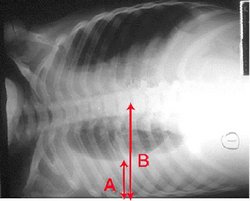PURPOSE: To evaluate the efficacy of the flexirigid thoracoscope as a tool for the diagnosis in pleural effusions of unknown etiology.
METHODS: Between May 2002 and October 2004 19 patients with pleural effusion who had remained undiagnosed even after thoracentesis were performed medical thoracoscopy under local anesthesia using a flexirigid thoracoseope, a rigid thoracoscope with a bidirectional flexible tip. Patients were examined using supplemental oxygen, either in the endoscopy suite, or at the bedside in a general ward after premedicated with an intramuscular injection of hydroxyzine and pentazocine.
RESULTS: The mean age was 69 years, with a male/female ratio of 5:1. A definitive diagnosis was made in 17 of the 19 patients (89%), 6 malignant pleural mesothelioma, 5 metastatic pleural carcinoma, 4 tuberculous pleurisy, 1 empyema, and 1 uremic pleurisy. The mean examination time was 22 minutes. Complications observed were; 1 case of CO2 narcosis, 1 case of pneumothorax, and 5 cases of subcutaneous emphysema. There were no fatalities.
CONCLUSION: The flexirigid thoracoscopy under local anesthesia can be considered to be a rapid, easy, less invasive, and moreover an accurate diagnostic procedure.
CLINICAL IMPLICATIONS: It is expected to become a routine examination for pleural effusion of unknown etiology.
DISCLOSURE: Atsuko Ishida, None.
Atsuko Ishida MD * Teruomi Miyazawa MD Yuka Miyazu MD Yasuo Iwamoto MD Koji Kanoh MD Mika Zaima MD Takeo Inoue MD St. Marianna Univ. School of Medicine, Kawasaki, Japan
COPYRIGHT 2005 American College of Chest Physicians
COPYRIGHT 2005 Gale Group



